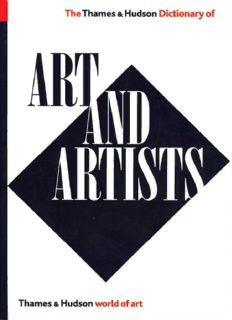
The Thames and Hudson Dictionary of Art and Artists (World of Art) PDF
Preview The Thames and Hudson Dictionary of Art and Artists (World of Art)
Sir Herbert Read was one of the most prominent writers on twentieth-century art, whose numerous publications include Modern Painting: A Concise History. He died in 1968. Nikos Stangos was a commissioning editor and director at Penguin Books and Thames & Hudson for most of his professional life. He worked closely with many leading poets, art historians and artists of the day. He edited David Hockney by David Hockney and That’s the Way I See It by Hockney. He also edited a number of other books including Concepts of Modern Art in the World of Art series. He died in 2004. Other titles of interest published by Thames & Hudson include: The Thames & Hudson Dictionary of Art Terms The Thames & Hudson Dictionary of British Art The Thames & Hudson Dictionary of the Italian Renaissance The Gallery Companion: Understanding Western Art How to Read a Painting: Decoding, Understanding and Enjoying the Old Masters Mirror of the World: A New History of Art Styles, Schools and Movements: The Essential Encyclopaedic Guide to Modern Art Other reference titles in the World of Art series include: The Thames & Hudson Dictionary of Fashion and Fashion Designers The Thames & Hudson Dictionary of Graphic Design and Designers See our websites www.thamesandhudson.com www.thamesandhudsonusa.com FOREWORD This dictionary provides comprehensive information on the fine arts, with entries on paintings, sculptures, drawings and prints, and the artists who have made them, throughout the world. The Thames & Hudson Dictionary of Art and Artists also covers historical styles and movements in the arts and groups of artists; in addition it contains entries on techniques, materials and terms, as well as on the major writers whose ideas have influenced the course of art and the work of artists. The aim is to be precise and specific, but without shirking the responsibility of providing, where necessary, some critical evaluation. On the whole, discursive articles on subjects such as English art, which by their very nature cannot be sufficiently detailed, are not included. One departure from this general principle is the inclusion of more general entries on cultures outside the Western world – in several of which the anonymity of the artist is a common occurrence. There are, however, entries on individual artists as well, where these are known by name and are likely to be encountered. The majority of entries on movements and artists active before 1945 were originally written for the Encyclopaedia of the Arts, whose consulting editor was Sir Herbert Read, managing editor Geoffrey Hindley and assistant editor Nathaniel Harris, and was published by Thames & Hudson in 1966. Many of these entries, however, have been substantially revised and updated, and about 40 per cent more have been added. The result is that this dictionary comes right up to date. By providing extensive information on contemporary art and artists not accessible elsewhere, together with full examination of the arts of the past, on a universal scale, it is an unrivalled reference work. This revised, updated and expanded edition of the dictionary now includes more than 2500 entries. Over 200 new entries have been added to those in the previous edition, not only to bring the dictionary up to date, but also to correct injustices in previous editions. It should perhaps be noted that the relative length of artists’ entries does not necessarily imply the degree of their importance. Extensive cross-references provide the reader with the full context in which an artist has worked. Nikos Stangos ABBREVIATIONS Most of the abbreviations in this dictionary are in common use or are self- evident: e.g. the name of the artist or subject which forms the headword is referred to in the text of the entry by the first letter(s) (Michelangelo becomes M.). Abbreviations such as ill. indicate various forms of the same word: illustrator, illustrated, illustration. We have generally followed the Oxford English Dictionary in using full stops after abbreviations only where the last letter is not the last letter of the word in full. Thus: ill. (illustration, illustrator), ills (illustrations); c. (century), cs (centuries), etc. anon. anonymous b. born c. century c. circa cm. centimetre coll. collection d. died ed. edition, editor, etc. fl. floruit Fr. French ft feet Gal. Gallery Ger. German Gr. Greek Inst. Institute It. Italian Jap. Japanese km. kilometre Lat. Latin Lib. Library m. metre ms., mss manuscript(s) M.O.M.A.Museum of Modern Art, New York N.G. National Gallery, London N.Y. New York R.A. Royal Academy, London SS Saints St Saint Tate Tate Gallery, London U.S.(A.) United States (of America) V.&A. Victoria and Albert Museum, London vol. volume A Aaltonen Waïnö (1894–1966). Finnish sculptor and painter and a major force in modern Finnish sculpture. His work in granite is classical in line despite its monumental character. Besides a number of female torsos and portrait heads, A. executed public monuments. Abbate Niccolo dell’ (c. 1512–71). A Modenese painter who, from 1552, worked in France and was, with Primaticcio, a leader of the school of Fontainebleau. A. was stylistically influenced by the illusionism of Mantegna and the softness of Correggio, but more important was his characteristically Mannerist treatment of landscape, as in the Rape of Proserpine. There are similarities in his work to Dosso Dossi and also Patenier and the Antwerp school, and A. himself introduced Mannerism in landscape into France. A major picture is The Story of Aristaeus. Abbate The Story of Aristaeus (detail) c. 1557 Abbey Edwin Austin (1852–1911). U.S. oil painter, watercolourist and book ill., who worked much in Britain, becoming an R.A. in 1898. He drew ills in pen for works by Robert Herrick, Oliver Goldsmith and Shakespeare, and painted the scenes of The Quest of the Holy Grail on the walls of the public library, Boston, Mass.
Description: